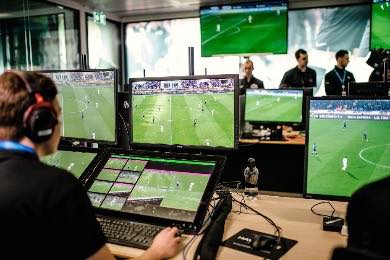A burning scandal is shaking the Bundesliga to its core and turning the spotlight away from what should have been a highly anticipated football clash between 1. FC Köln and RB Leipzig. Hours before kickoff, explosive allegations surfaced that the refereeing team in charge of the match, including the VAR officials, may have been influenced or even bribed to manipulate decisions during the game. The mere suggestion of such corruption is enough to ignite fierce debate, spark outrage among fans, and put the entire league’s credibility on trial. What was supposed to be a thrilling evening of football has instead transformed into a powder keg of accusations, suspicion, and speculation about whether the integrity of Germany’s top flight has been compromised.
Football thrives on passion, fairness, and trust. When supporters stream into stadiums, they want to believe that every goal, every penalty, every red card is decided on the pitch by the players’ abilities and not by external influence. Yet the reports that emerged about today’s Cologne versus Leipzig duel threaten to rip that very foundation apart. The allegations, if true, suggest that individuals behind the VAR screens – those entrusted with ensuring fair play – may have been swayed by bribes. Though no official evidence has yet been confirmed, the fact that such claims even exist is enough to set German football ablaze with controversy. Fans of Cologne, already feeling underdogs against a wealthy Leipzig side, reacted with fury on social media, declaring that the game was “lost before the first whistle.” Leipzig fans, meanwhile, found themselves in an awkward position, defending their club’s honor while insisting that they have no role in what is being described as a refereeing scandal.
The Bundesliga has always prided itself on transparency and professionalism, especially when introducing technology like the VAR system. Germany was among the leagues that most eagerly embraced the promise of video assistance, believing it could reduce human error and ensure a fairer sport. Now, however, the system is under fire not because of technical glitches but because of the integrity of the people operating it. If VAR officials are compromised, then the very purpose of the technology collapses. Instead of eliminating unfairness, it could become a tool for manipulation. That thought alone chills every football lover to the bone, as the sport risks being reduced to a puppet show where results can be bought and sold.
For Cologne, the timing of this scandal could not be worse. The team entered the match desperate for points after a rocky start to the season, with fans urging their players to fight for every inch against Leipzig’s attacking power. News of the VAR bribery allegations turned the buildup into chaos. Instead of discussing tactics, lineups, and key battles on the pitch, the focus shifted to whether the refereeing team could be trusted at all. Questions swirled about why such reports emerged precisely before this particular fixture. Was it a smear campaign? A calculated attempt to destabilize one of the sides? Or could it truly be a leak exposing corruption at the heart of the game?
Inside the football community, reactions were immediate and polarized. Pundits on German television shows dissected every angle. Some argued that the scandal must be investigated thoroughly before passing judgment, reminding fans that allegations are not proof. Others, however, claimed that the Bundesliga could not afford to take such rumors lightly, warning that the global reputation of the league was at stake. For years, the Bundesliga has marketed itself as a fair, fan-friendly, and authentic competition, standing in contrast to what some consider the more commercialized Premier League or La Liga. If manipulation is proven here, it would shatter that image and undermine decades of work to maintain trust.
Players, too, found themselves caught in the storm. For professionals on both sides, the idea that their efforts could be nullified by refereeing corruption was devastating. Cologne’s veterans, many of whom have given their careers to fighting for the club’s survival in the Bundesliga, reportedly felt anger and betrayal when reading the allegations. Leipzig’s stars, meanwhile, knew that any controversial decision in their favor would now be viewed with suspicion. A simple penalty awarded could be interpreted as proof of manipulation, even if it was legitimate. That poisoned atmosphere guarantees that every referee whistle in the game will be scrutinized, replayed, and dissected by fans and media alike.
The German Football Association (DFB) quickly released a cautious statement, insisting that it takes the allegations very seriously and promising a full investigation. The league’s integrity unit, rarely mentioned publicly, has reportedly been mobilized to gather information, review communication records, and analyze any potential irregularities in betting markets tied to the match. The mention of betting markets immediately raised the stakes, as the possibility of gambling influence on refereeing decisions is one of football’s darkest fears. European football has faced such scandals before, from Italy’s infamous Calciopoli to match-fixing cases in Turkey and Eastern Europe. The idea that the Bundesliga could join that list is a nightmare scenario for German officials.
Supporters in Cologne took to the streets before the game, displaying banners that read “Fair Play, Not Bought Decisions” and chanting against what they described as “VAR corruption.” For a fan base that prides itself on loyalty and emotional support, the thought that their beloved club might be cheated before the ball is even kicked feels like a personal insult. Leipzig’s traveling fans, on the other hand, worried that they would become scapegoats, unfairly accused of benefiting from something they had no control over. The stands in Cologne’s RheinEnergieStadion promised to be not only loud but also tense, with every refereeing action feeding the storm of suspicion.
Experts point out that scandals of this magnitude often have lasting consequences far beyond the game in question. If the allegations are confirmed, it could trigger resignations within the refereeing body, suspensions of VAR officials, and even potential point deductions or annulments of results. Sponsors, too, are watching closely, as no major brand wants to be associated with a league tainted by corruption. Broadcasters who pay billions for rights demand assurances that what they show is authentic competition, not manipulated drama. The stakes, therefore, extend from the pitch to the boardrooms of Germany’s most powerful corporations.
Skeptics, however, raise an alternative interpretation. They suggest that the timing of the scandal may be intentional sabotage. In a league where financial disparities already breed resentment, conspiracy theories flourish easily. Some claim the allegations were leaked to destabilize Leipzig, a club already unpopular among many traditional fans due to its Red Bull backing. Others argue it may be aimed at Cologne, to create excuses in case of defeat. In the modern media landscape, where outrage spreads faster than facts, simply planting the seed of corruption can be enough to create chaos. The truth may take weeks or months to establish, but the damage to trust is immediate.
As the referee blew the opening whistle, the shadow of scandal loomed over every moment of the game. A foul call near the box? Was it bought? An offside check lasting unusually long? Was someone trying to tilt the outcome? Even neutral viewers could no longer watch without suspicion. That is perhaps the deepest wound such allegations inflict: the erosion of innocence. Where once fans could debate tactics, now they debate whether football itself is honest. The game, instead of being a celebration, becomes a courtroom where every decision is evidence for or against corruption.
Whatever the eventual findings, this incident will be remembered as a turning point in German football. If the refereeing team is cleared, the league must still address why confidence in VAR and officials is so low that such allegations gained traction. If wrongdoing is proven, then a purge of the refereeing structure may follow, alongside stronger safeguards against influence. In both cases, the Bundesliga faces a credibility crisis that will not vanish overnight. Cologne versus Leipzig was supposed to be about footballing drama, but instead, it has become a symbol of a larger battle: the fight to preserve fairness in the sport loved by millions.
In the coming days, fans will continue to argue, journalists will continue to investigate, and league officials will continue to assure the public that all is under control. But the truth is, the damage has already been done. Whether the bribery scandal is real or not, trust has been shaken, and once shaken, it is hard to restore. For Cologne, Leipzig, and the Bundesliga as a whole, today’s match will go down not for goals scored or points won, but for the shadow of manipulation that hung over every moment. And for German football, the question will linger: if even VAR cannot guarantee fairness, then what can


